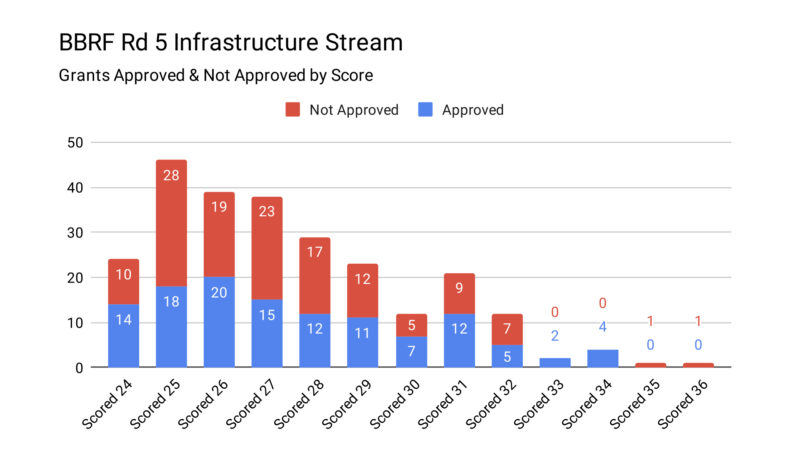Time, energy and resources have been wasted by a large number of regional and rural organisations who held the false belief that their application for a grant would judged on merit, writes Jommy Tee in the second of two articles
An animal management facility, a bioenergy project, a waste sorting and recovery facility, and a reservoir connection upgrade were among the many worthy projects rejected by the ministerial panel overseeing Round 5 of the Building Better Regions Fund (BBRF).
The identified projects, together with 36 other projects, share a common bond – they were highly ranked projects that inexplicably were overlooked for a grant. Instead far lower and poorer scoring projects were awarded funding by a ministerial panel.
Round 5 was originally funded with $200 million, until a cabal of ministers and the cabinet added an unexpected $100 million to the kitty. The $300 million in funds delivered a bonanza of rorts and a raft of injustices.
Even with the extra $100 million the top-ranked projects in the Infrastructure and Tourism streams of the BBRF failed to get funded.
We can report that a total of at least 150 projects were promoted by ministers from what ordinarily would have been against departmental recommendations if the same system applied in Round 5 as it did for previous rounds.
However, none of this ministerial meddling will be reported because of an administrative fix.
We exposed the administrative fix – the “butterfly effect” – in our last BBRF article here.
Rampant rorts in the regions: how it happens
The cover-up involved giving ministers a list of all eligible projects in program for Round 5 but without departmental funding recommendations, thereby bypassing the requirement to report to the minister for finance on grant overturns.
Technically there are no more overturns as they have been defined out of existence by a clever and cunning workaround that trashes accountability and hides gross injustices.
Departmental officials at Estimates described the fix as “continuous improvement”.
Michael West Media (MWM) has seen a list of the approved and non-approved projects for BBRF Round 5, including their individual scores and ranking. This has enabled us to determine the applicable threshold scores for funding.
It’s easier to get a grant if you ranked last than first
The threshold for funding based on the original allocation of $200 million would have seen applicants scoring 31 or higher in the Infrastructure Stream being recommended for funding and those scoring 30 or higher for the Tourism Stream being recommended. The maximum score possible was 40.
This is consistent with funding being distributed on the basis of merit – an alleged principle of this program.
More than half the projects (40 projects) that met the respective thresholds were NOT funded.
This included the top-ranked (score of 36) and second-ranked project (score of 35) in the Infrastructure Stream.

The top-ranked (score of 36) and three out of the four equal second-ranked projects (score of 34) in the Tourism Stream. Unlucky.
Well no, as on merit those applications deserved grants. Instead they were done over by the ministerial panel overseeing the program.
The panel’s tinkering managed to fund many of the projects that ranked equal last or near last.
Across the two streams, 23 projects that were ranked equal last, scoring 24/40, were given grants. Twenty-six applications that ranked equal second last, scoring 25/40, were given grants. Thirty-four applications ranked equal third last, scoring 26/40, were given grants. Lucky them.
Merit seems to have gone for a walk out the door and replaced by a group of ministers.
The ministerial panel for Round 5 consisted of the Deputy Prime Minister Barnaby Joyce as chair, together with ministers David Littleproud, Dan Tehan, Anne Ruston, Bridget McKenzie, Richard Colbeck, David Gillespie, Nola Marino, Kevin Hogan and Ben Morton.
Departmental advice was sent to the panel on August 27. The panel obtained cabinet approval on October 6, and the grants were announced over subsequent days, both in national and local media.
Gotta show the constituents how good we are …. don’t mention the projects done over by us though.
In reality, the ministerial panel and the cabinet presided over a farcical and dubious process designed to maximise public money going to Coalition seats.
The grants awarded were heavily skewed towards to Coalition seats (73%) – the rest were split between Labor (16%) and Independent-held seats (11%).
Multiple marginal and low scoring projects were funded – many high-ranking projects were not.
A fair and partisan-free process would have seen only 65 projects given grants, exhausting all the original available funding, across the two relevant streams.
Instead, the ministerial meddling enabled close to 200 projects to be funded – with a minimum of 150 grants going to projects below what ordinarily would have been the thresholds for a $200 million program. Even factoring in the extra $100 million the numbers change only marginally.
What of the have-nots?
Frustratingly, none of the high-scoring projects denied funding would be any the wiser. Only generic advice and feedback is provided to unsuccessful applicants. They are not advised of their score and ranking.
A significant amount of time, energy and resources have been wasted by a large number of applicants submitting applications in the false belief that their application for a grant would judged on merit.
The vast majority of BBRF applicants are regional and shire councils, who submit multiple projects per round. As some of the projects get funded and others don’t this further obscures the inequitable decisions, muddying the waters and throwing the hounds off the scent.
A departmental spokesperson advised us: “Applicants are encouraged to submit a new application for the same, or similar, project in any future funding rounds – and to include any further information to address the weaknesses that prevented their previous application from being successful.”
MWM contacted some of the councils, who had projects rejected. All were extremely hesitant to speak, none wanted to go on the record. Some were considering resubmitting their projects in future rounds of the program. Tellingly others preferred not rocking the boat and risk undermining the relationship with the federal government.
What of the ministerial panel?
The minister responsible for reporting on Round 5 is the Deputy Prime Minister as the relevant portfolio minister. We put detailed questions to Barnaby Joyce about the blatant manipulation by the panel, and whether panel recused themselves when awarding grants in their electorate.
We also asked what the Deputy Prime Minister would say to the large number of applicants that submitted projects in good faith, scored very highly and ranked very highly only to be done over by the ministerial panel which awarded grants to less deserving and meritorious applications.
Zero response. Zero, courtesy of the “butterfly effect”, being the exact number of BBRF Round 5 ministerial overturns that will be reported to the Minister for Finance.
It also the number that best represents the transparency and accountability of the BBRF.
The government has announced a Round 6 of BBRF with another $250 million of funding, bringing the total funding across its life to rortingly gargantuan $1.63 billion.
The ANAO is currently auditing the program its report is not due until May 2022 – most likely after the election.
A likely groundhog day scenario awaits of the ANAO excoriating the program but with no consequences for the ministers and officials who oversee it.
Bring on a federal anti-corruption commission with the largest fangs possible.
- A third stream – Community Infrastructure Stream – was also available in BBRF Round 5. It awarded 101 grants worth a total of $6.1 million to every eligible applicant. Three applications were subsequently reclassified by the government from the Infrastructure Stream to the Tourism Stream.
Jommy Tee is a long-time career public servant, having worked in the policy development field for 25+ years as well as an independent researcher interested in politics, current affairs, and Nordic noir.

